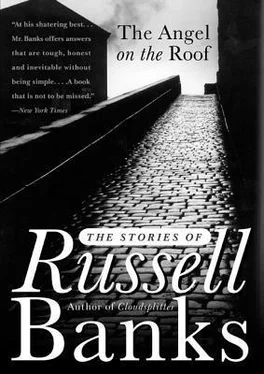My brother didn’t say anything, but my father never asked him to. I was the one he worried about; I was the one my mother would interrogate.
The house itself had not changed. Except for a coat of blue-gray paint, it was still the same two-story farmhouse with the long shed attached at the rear and the weather-beaten, unpainted barn across the circular drive. The two stone chimneys at the ends of the house were matched by the pair of huge maple trees next to the road. Hanging from one of the trees was a small wooden sign. RETTSTADT’S RESTAURANT, it said. SERVING DINNERS FRI.TO SAT. 5 P.M. TO 9 P.M. I could not imagine who would drive all the way out from Tobyhanna — five miles through the woods on a narrow, winding, hilly road, passing barely a dozen other houses on the way, broken-down and half-finished bungalows and trailers set on cinder blocks among car chassis and old refrigerators and tires — for dinner at Rettstadt’s.
I looked at my watch, 4:45, and drew my car off the road, pulled into the driveway, and parked by the back porch, facing the door that, when we lived there, opened into the kitchen. By now, my limbs felt weak and awash with blood, and my heart was pounding furiously, as if I were at the entrance to a cave.
By the time my father and brother and I arrived home, the snow was coming down heavily, and my father told my mother that the snow had slowed him up, he had got stuck twice, and, besides, he had to spend quite a while at the office at the depot working on some drawings for Monday. That was why we were so late getting home from town.
My mother looked at him wearily. It was the same old story, the same old challenge tossed down, the dare for her to take him on one more time: either believe the liar or enrage him by forcing him to tell the truth.
I know from photographs that my mother was a pretty woman— small, blond, precisely featured, with lively hazel eyes and a sensitive mouth. “Petite,” she liked to say of herself. People said she looked like beautiful women — Claudette Colbert, Ann Blyth, Bette Davis — and she did. Not like any one of them, but she belonged to that particular caste of beauty. I remember her that afternoon standing before the stove, a ladle in hand, a steaming pot before her — but that, too, is a generic image, like her beauty. It was a Saturday afternoon; it was snowing.
My brother dodged around her and disappeared like a mouse through the living room toward the stairs and the unused bedroom on the second floor, a kind of attic in the back where we had set up our electric trains. My sister — I have no idea where she was, possibly in the kitchen, possibly with a friend for the afternoon: country children often visited each other on weekends; it made the driving back and forth easier for the parents. I hung around by the kitchen door, as if waiting for orders from one or the other of my parents. They were looking angrily at one another, however, and did not seem to know that I existed.
My mother said, “I know where you’ve been. I can smell it on you. I can smell her, too.”
My father’s face reddened, and he glowered down at her from his full height, which, because my mother was small and I was only twelve years old, seemed a considerable height, though he was never any taller than six feet, which turned out to be my height as well. He began to shout at her. It was at first a welling-up and then an over-flow of anger, wordless — or no words that I can recall — a kind of sustained roar, which she answered by letting loose with shrieks, cries, calls, wails — again, with no words that I can recall now and surely could not hear then, for the tone was all one needed in order to understand the sad rage this man and woman felt toward one another, like a pair of beasts caught side by side, each with a limb in the jaws of the same cruel trap, and then they begin to gnaw on the flesh and bone of their own trapped limbs.
What in 1952 had been the kitchen was now a restaurant dining room, the floor covered with bright green, indoor-outdoor carpeting, the walls paneled over in imitation pine with five-and-dime framed pictures of a trout stream with a deer bending its head to drink, a barn and silo and amber waves of grain, a covered bridge with throngs of fall foliage behind it. I smelled food cooking and walked through the door that had once led to the woodshed behind the kitchen and discovered that it led now to a large, open room filled with stainless steel counters, dishwashers, sinks, and stoves. I saw in the far corner of the room a small man in white pants and T-shirt scrubbing utensils in a sink. He saw me and waved, as if he’d been expecting me. He was in his late fifties, I guessed, square-faced, short, thick-bodied.
I said, “I’m not here to eat, don’t worry.”
He smiled and nodded. “We’re not set up yet, anyhow. Too early, friend.”
“Yes, well, I’m not here to eat,” I repeated. “I used to live here.”
He squinted across the room at me. Then he pursed his lips and pronounced my last name. My very name!
“Yes!” I said, astonished. “That’s right!” I did not know this man, I had never seen him before. I felt my father loom up beside me, huge and red and full of heat, and I looked automatically to my left, where I felt his presence most, and leaned away from him, then recovered, and stood straight and regarded the small man in white before me.
He put down the spoon he’d been scrubbing and took a step closer. He said my father’s first name and his last. “The plumber. Right? The plumbing guy?”
“Well, yes. My father. I’m not him, though. I’m his son.”
He examined my face for a few seconds, as if he did not believe me. He was looking at a gray-haired man in his late forties, a man nearly a decade older than my father had been in 1952. I was, however, more likely my father than my father’s son.
I told him that my father had died over five years ago.
He was sad to hear that and asked what he died of.
I said, “He pretty much drank himself to death.”
He nodded. “Yeah, well, those construction guys. They all hit the booze pretty hard. I ran the food concession for that job your dad was on, down there at the depot,” he said. “I was a kid then, just out of the service. I knew your dad. What a guy he was! Memorable. He had what you call real personality, your dad.” He wiped his hands with a towel and stuck one out to shake. “George Rettstadt,” he said. “I bought this place a few years after your dad lived here. He rented it, right? Brought your mom and the kids out from someplace in New England for a while, right? C’mon and look around, if you want. I’ve made loads of changes, as you can see,” he said, waving his arms at the four corners of the room, like the drunk at the bar.
I agreed. There had been a lot of changes. But even so, it was the same house, and it smelled the same to me, the light fell at familiar angles through the maple trees and tall, narrow windows, rooms opened into rooms where they always had. Rettstadt had turned woodshed into kitchen and kitchen into dining room, he had covered walls and floors, and he had lowered ceilings, hung brass lamps and tacky pictures. He had altered the whole function of the house — though he still lived in it, he assured me, upstairs. The living room was now a large second dining room that was for private parties, which he said was most of his business. “You know, Lions Club, Boy Scouts, stuff like that. Reunions, weddings, like that.”
Rettstadt walked ahead of me, pointing out the changes, while I saw only the house that lay hidden beneath this one, the white house under the blue one, the drab, decaying farmhouse in the woods where a young man had stuck his unhappy wife and bewildered children while he drove into town to work every day and to drink every night and tried to invent a man he could never become.
Читать дальше












